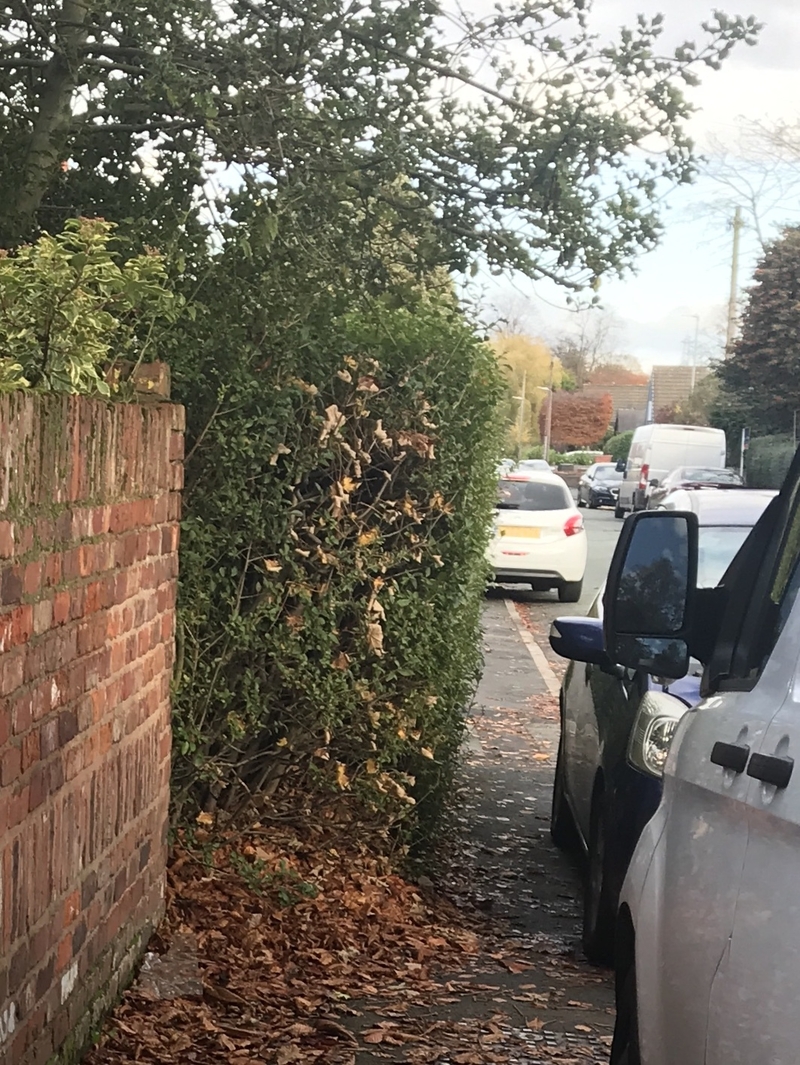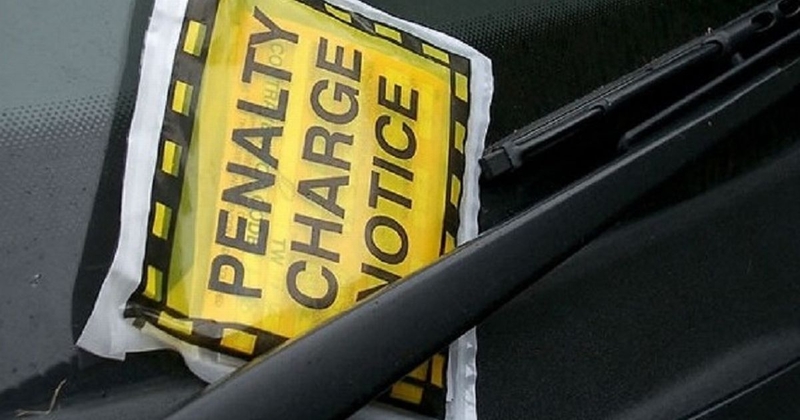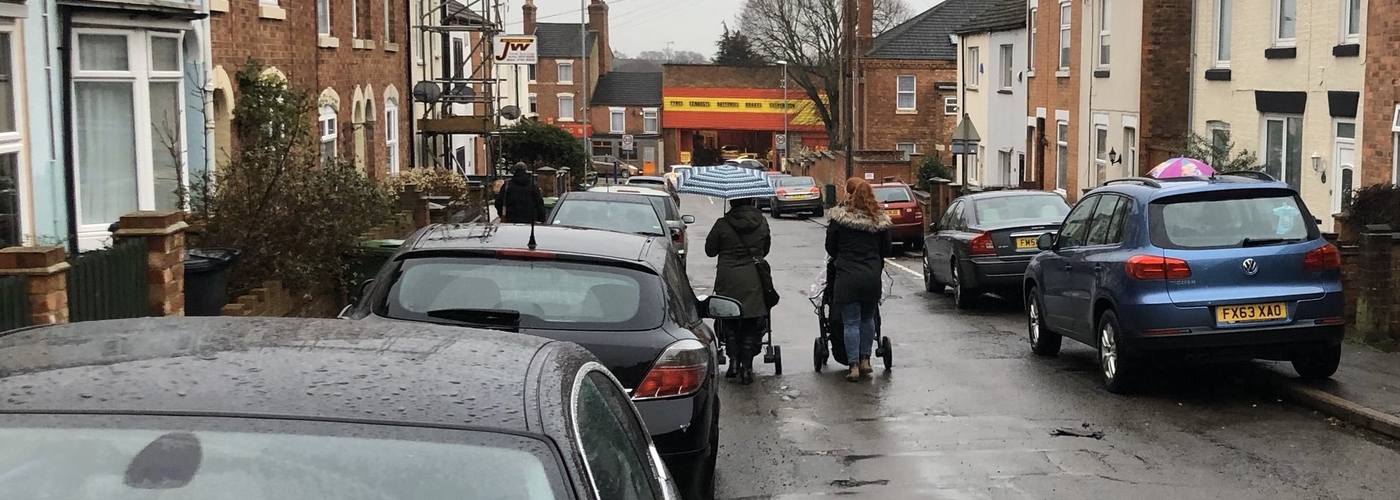Is the law about to change for obstructive drivers in Manchester?
Pavement parking is the bane of many pedestrians’ lives – cars or vans pulled up over the pavement meaning that wheelchair users and parents pushing prams are forced to swerve out in the road, often unable to see if there is oncoming traffic.
Even for able-bodied pedestrians there are days when it seems like the city pavements are something out of the Krypton Factor, so imagine what it must be like faced with added difficulties.
Mindful of these issues, a group of MPs has called for a new nationwide law against pavement parking.
Cars parked on the pavement put people with sight loss and other vulnerable pedestrians in danger
The Transport Committee report condemned government inaction on the issue, with evidence produced in hearings describing the worst cases of pavement parking effectively trapping disabled, elderly and vulnerable people and making them “afraid to leave their homes.”
Guide Dogs for The Blind also threw its weight behind the call with a petition against pavement parking. A survey by Guide Dogs showed that 97% of people with vision impairment encountered problems with street obstructions, and 90% of those had experienced trouble with a pavement parked car.
A YouGov survey showed that over half of motorists had considered the problems pavement parking would cause to pedestrians, but had chosen to do so regardless.
A spokesperson from charity Guide Dogs said: “We need a new nationwide law to end inconsiderate and unnecessary pavement parking.
“Drivers may not always realise, but cars parked on the pavement put people with sight loss and other vulnerable pedestrians in danger.”

Closer to home, Cllr Marcus Johns of Deansgate Ward said: "As a City Centre Councillor, I would like to see pavement parking essentially banned with the committee's recommendation to make it a civil offence to obstruct pavements by parking.
“Pavements are for pedestrians. People often forget that pedestrians always make up the highest share of travel. I think it's disrespectful, unthinking and arrogant. Those drivers assume that their desire to park right next to their destination is more important than someone in a wheelchair, a family with a pram, or other pedestrians using the streets as designed. And it is not. Driving and parking is not a right, not when you're obstructing people and making their life difficult, not when you're choking residents with pollution, and not when you're able to use public transport or walk or cycle.
“I'd also say that driving on the pavement and parking there also cracks and breaks pavement flags, which is a waste of money for everyone involved—fining those disrespectful drivers so that they stop doing it and we can use the money to repair the pavements that they keep breaking would be a helpful new power from Government to Councils."

Of course the counter-argument is that there is just not enough parking without using the pavement. We live in a city of Victorian streets, designed for Victorian amounts of cars – which is to say, barely any. If cars were to fully park on both sides of the street without using the pavement there might not be enough room for emergency vehicles such as fire engines to get through, with potentially fatal consequences.
One reason that pavement parking has been allowed to become an issue is a certain amount of ambiguity surrounding its legal status. The relevant section of the Highway Code states that “You MUST NOT park partially or wholly on the pavement in London, and should not do so elsewhere unless signs permit it.” Those words ‘should not’ have been interpreted as more advisory than admonitory.
Rule 242 is even less clear, stating: "You MUST NOT leave your vehicle or trailer in a dangerous position or where it causes any unnecessary obstruction of the road."
Essentially, in London, you cannot park on the pavement unless there are specific signs that say you can. The reverse is true in the remainder of the UK causing bewilderment amongst drivers and inconsistency in enforcement.
Read - Interviews with Inanimate Objects: Manchester’s Pavements

In September the Transport Committee recommended that there be nationally enforced civil offence of ‘obstructive pavement parking’. This means that anyone found parking on the pavement would be fined but not gain a criminal record from the offence.
Currently councils can ban pavement parking, but only on a road-by-road basis, which is time-consuming and expensive. The police can fine a car which is causing obstruction but rarely tend to use their powers except in the most extreme cases.
A spokesperson from Manchester City Council advised: “if a vehicle is parked on the pavement adjacent to a road that has yellow lines restricting parking, then the vehicle will be parked in contravention, as the yellow lines extend to the middle of the carriageway and the boundary wall. A Penalty Charge Notice would be issued in this situation. If there are no parking restrictions in place, on the other hand, then this would be a matter for Greater Manchester Police.”
Can anyone help get the pavement cleared of illegally parked cars in @OurCastlefield ? Tried @ManCityCouncil @GMPCityCentre to no avail sadly. @deansgatelabour @joand7 @CllrMarcus @WilliamJeavons pic.twitter.com/m74MUJWZra
— Steven Lindsay (@StevenJLindsay) November 12, 2019
Manchester City Council is giving signs that it leans in favour of the recommendation. It is understood that Manchester lobbied for the right to decide what happens with pavement parking as part of the city’s devolution deal. Chris Boardman, the city's cycling commissioner, is also taking an interest in the issue. Furthermore, the Climate Change Subgroup report mentions “dealing with pavement parking” as one of its aims for a greener, more pedestrian-centric city.
As the main argument in favour of pavement parking is that there is simply not enough room for all the cars, one solution would be to reduce the amount of cars. However this means a systemic overhaul of the transport system, making it feasible for an individual to be able to commute to work and take part in leisure activities without a car, which is still not the case in many areas. Dealing with this one apparently minor issue shows the fine balance between different area of legislation and how charging one aspect of it can have a huge knock-on effect.
I agree https://t.co/YQLCFzrc2x
— Chris Boardman (@Chris_Boardman) October 17, 2019
Many people argue that creating a new law is over the top, and that all we need to do is exert social pressure to make drivers realise that they must leave space on the pavement for pedestrians (the recommended amount of space is somewhere between 1.2 and 2 metres, depending on the pavement). But this seems impossible without some form of legislation.
Perhaps not seeing drivers and pedestrians as opponents is the first step towards a solution. After all, even those of us who mainly walk and use public transport have benefitted from a lift now and again, and motorists also have a concern for properly maintained and usable streets. As Cllr Johns puts it: “we are all pedestrians wherever we go for part of our journey. Even those people parking on pavements need to use the pavements to get to their final destination!"
Read - Should Deansgate be pedestrianised?
#PavementParking is making my work more difficult than it needs to be! It’s only Monday & I’ve been forced to take @BlindDad_Uk on to the the road to navigate on coming traffic on three different occasions. Situations like these soon wipe the smile off your face 😧🐶🧔🏽🚗🚌🚚 pic.twitter.com/CrxpoFThXb
— Kika 🇬🇧 (@Kika_GuideDog) April 1, 2019
What to do if pavement parking is making your journey difficult
You can report obstructive parking here
If there is a persistent pavement parking problem get in touch with your local councillor, who may be able to look into alternative solutions, such as installing a bollard.
If you are a driver remember to leave 1.2-2 metres on the pavement, enough for a buggy or wheelchair user.
















